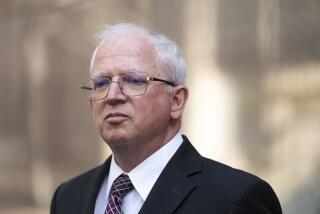Libby’s bind: Testify or not?
- Share via
WASHINGTON — Starting Monday, lawyers for I. Lewis “Scooter” Libby will begin their defense of the indicted former White House aide with a parade of witnesses, including prominent journalists, former co-workers and maybe even his old boss, Vice President Dick Cheney.
But will Libby testify?
Libby and his lawyers face a Hobson’s choice about what is normally the make-or-break decision in criminal trials.
His unusual defense to perjury charges in the CIA leak case -- that he misspoke because he was having to juggle so many other duties as Cheney’s chief of staff -- would seem to require that he take the witness stand to explain it.
But if he testifies, Libby also risks exposing himself to serious questions about his credibility and a grilling by a prosecutor with a reputation for doggedness.
“He is in a tough position,” said Carolyn Koch, a Fairfax, Va., jury consultant. “As a defendant, you don’t want to help the government prove the case against you. [But] it seems impossible for him not to testify. How can you have a memory defense and not testify about your own memory?”
Almost from the moment he was indicted in October 2005, Libby, through his lawyers, has indicated that he planned to testify. The possibility that his legal team is flirting with the idea of keeping him off the witness stand was raised in court papers last week.
Special Prosecutor Patrick J. Fitzgerald has said that U.S. District Judge Reggie B. Walton should not allow the defense to raise the memory issue unless Libby testifies. Libby’s lawyers said in the filing with Walton that putting conditions on the defense would violate their client’s right to remain silent under the 5th Amendment.
Some experts said they doubted Libby would choose not to testify, and they viewed the filing as a legal ploy to draw a ruling from Walton that could be used as a basis to overturn any verdict against their client on appeal. They could argue that Libby was, in effect, coerced to testify in violation of his constitutional rights.
Not testifying has worked for some defendants, perhaps most famously O.J. Simpson in his murder trial.
Theodore Wells Jr., Libby’s lead lawyer, once represented former Agriculture Secretary Mike Espy at a trial in which Espy chose not to take the stand; he was cleared of bribery charges.
But most experts said the strategy works only when the government case appears weak. Simpson had the benefit of the famous glove that did not fit. In the case against Espy, prosecutors were unable to show that the alleged bribes -- tickets to sporting events, among other gifts -- had any influence on his official conduct.
In Libby’s case, the government has avoided any major pratfalls, while raising substantial questions about what Libby knew and when.
He was charged with obstructing a federal probe into how the identity of CIA operative Valerie Plame became public in summer 2003, shortly after her husband, former envoy Joseph C. Wilson IV, accused the Bush administration of twisting prewar intelligence on Iraq.
Libby allegedly made up a story that he first learned about Plame from Tim Russert of NBC News, and passed along what he said was a rumor to other reporters. In testimony this week, Russert denied giving Libby that information; the government has alleged that Libby learned about Plame from Cheney weeks earlier and concocted the Russert story because he feared being charged with leaking classified information.
The jury already has heard from Libby, through an audiotape of his grand jury testimony that the government played in court last week. The eight hours of testimony showed Libby sometimes struggling to answer questions from Fitzgerald, and may have left an impression that the defense wants to counter.
“The jury thinks it has a sense of who Libby is based on his grand jury testimony,” said Dan Richman, a professor at Fordham Law School in New York and a former federal prosecutor. “Whether that could be changed is an open issue. [But] that testimony does put some pressure on Libby to testify.”
Richman said that although jurors are not supposed to draw conclusions about a defendant’s decision not to testify, it is inevitable that some will.
But he also acknowledged Libby’s dilemma. “Given that the defense rests on a lack of recollection and a preoccupation with other matters, cogent, clear testimony from Libby now will sound odd,” Richman said.
Some lawyers said that for Libby, the downside to testifying is too great. The government would be able to attack his credibility by introducing other evidence of alleged misstatements he made to investigators during the case, even if they were not included in the indictment. Fitzgerald is considered a formidable interrogator whose command of case material is tops among federal prosecutors.
“Pat Fitzgerald has a black binder 4 inches thick,” said Joshua Berman, a Washington lawyer and former federal prosecutor who once worked with Fitzgerald on a terrorism case. “He is going to take big chunks out of Libby’s credibility.”
Berman said there were other ways to get the defense across, such as relying on documents and former aides, as well as attacking the government witnesses.
But others said that given the strength of the government case, Libby might not have a choice.
“Libby providing a credible and sincere explanation for his lack of recall may be his only hope,” said Henry Hockeimer, a Philadelphia lawyer and former federal prosecutor. “But he better be prepared for some 100-mile-an-hour fastballs on cross.”
More to Read
Sign up for Essential California
The most important California stories and recommendations in your inbox every morning.
You may occasionally receive promotional content from the Los Angeles Times.










